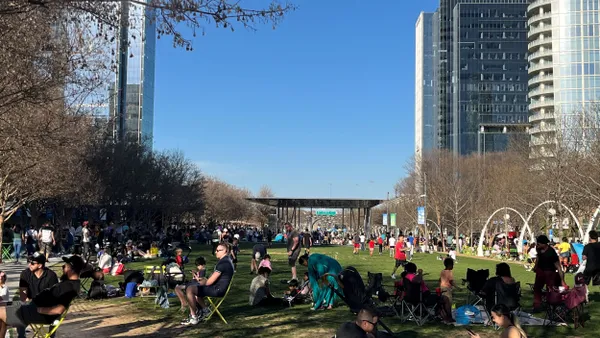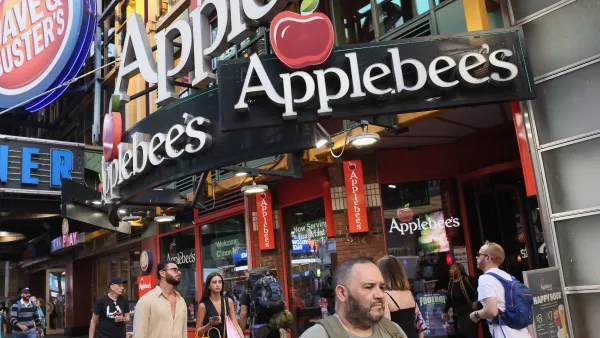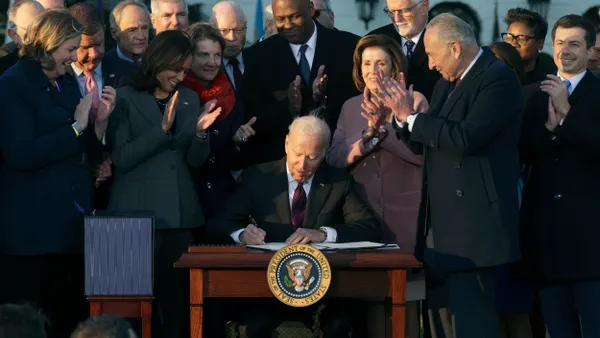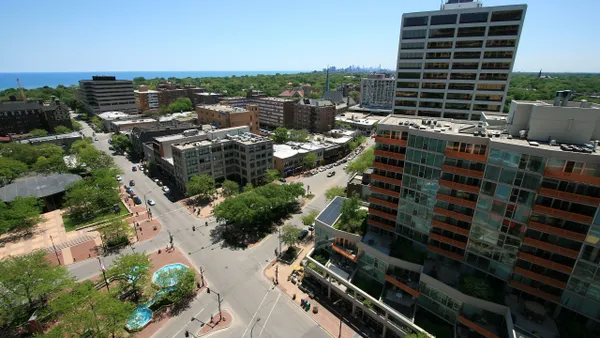Dive Brief:
- San Francisco has announced a Request For Interest in a bid to bolster economic recovery efforts and encourage reuse of underutilized downtown office buildings.
- The Office of Economic and Workforce Development, in concert with the San Francisco Planning Department, is inviting responses from downtown building owners and sponsors looking into specific projects that would convert underused commercial space into housing or other newer uses.
- This effort builds on a legislation authored by Mayor London Breed and President of the Board of Supervisors Aaron Peskin last week to streamline the process for filling vacant space and simplify requirements for converting existing commercial buildings.
Dive Insight:
The RFI aims to identify projects where the city can step in to ramp up or make it easier for building conversions to take place through zoning changes, regulatory measures and financial incentives.
San Francisco officials have said that they are seeking insights into how the city’s assistance will make existing and newer projects on the pipeline feasible, conferring more public benefits. Projects that responses are coming in for must be located in a C-3 or C-2 zoning district east of Franklin Street / 13th Street and north of Townsend Street.
Written questions are to be submitted by July 12 and answers to those written questions will be posted online by end of day on July 17. Responses to the RFI are due August 12. The announcement states that although “office-to-housing” projects are of particular interest, responses may include any conversion of a nonresidential floor area to new uses.
On the heels of Breed’s release of Roadmap to Downtown San Francisco’s Future earlier this year, the Urban Landing Institute’s Advisory Services Panel has been asked to help the city prioritize implementation actions and policy measure to create a downtown neighborhood that is not only inclusive, but also beneficial to residents, businesses and outposts across the broader Bay Area region.
“The roadmap the Mayor has laid out for Downtown’s future is a strong foundation for the work we have ahead, and the contributions of this panel of national urban planning experts both affirm and expand upon that vision,” Sarah Dennis Phillips, executive director of San Francisco’s Office of Economic and Workforce Development, said in an Urban Land Institute release.
Zeroing in on a 239-acre study area mostly within San Francisco’s financial district, the panel proposed recommendations that include:
- Specific downtown destination zones through ground-plane activation to help transform public spaces and empty storefronts into city attractions, and meet the needs of residents, workers and visitors.
- Funding to ensure comfortable rider experiences through the downtown area
- Reducing and restructuring businesses taxes, including gross receipts tax, commercial rents tax, CEO tax and transfer tax to facilitate a diverse mix of downtown businesses.
- Incentivizing office-to-residential conversions to address the housing shortage.
- Providing other incentives, such as impact-fee waivers and property tax abatement, through the Mills Act or other state legislative measures, to facilitate short-term conversions by reducing zoning and building code barriers to adaptive reuse projects.
- Mobilizing support from City Hall, the OEWD’s Economic Recovery and Regeneration division and other governmental and city stakeholders to reduce uncertainty, break down silos, drive new investments and expedite approvals.
Phillips of OEWD added that city officials are “moving ahead on many of the ideas called out by the panel,” including business tax reforms and efforts to make the downtown area more attractive.
The city, whose zoning regulations have not been conducive to reusing downtown commercial buildings, has been contending with hindering process requirements such as providing outdoor spaces like patios and balconies for new residential construction.
The city is also looking at how building code equivalencies can be identified and established to allow the reuse of buildings that are currently office space into residential units. To that end, officials are developing an adaptive reuse roadmap for architects, builders and developers to adapt their projects to existing and future changes to building codes. These are two areas that the ordinance passed last week aims to tackle.
“Building codes are a piece we’re dipping our feet into. The nuances of building codes are tied to each individual building. And, through this process, we hope to get a range of buildings we can look at so that we can learn what the right set of regulatory interventions might be for that particular building typology. Understanding what those diverging needs might be will help us put together a package for projects to happen across the greater downtown area,” Dan Sider, chief of staff at San Francisco Planning, said in an interview.
“We’ve taken a broader look at what we think is the baseline set of code adjustments, and that has been informed by lots of conversations with the industry. But we believe there’s more to be done. That’s what this next step is about,” he added.
The financial feasibility of projects presents a challenge, which has urged some developers and building owners interested in building conversion projects to ask the city for waivers and deferrals of fees and taxes.
“We have a substantial toolkit we can work with on our local taxes, burdens and regulations,” Sider said. “Right from historic tax credits to property tax release mechanisms to a whole gamut of development fees, everything is on the table. We’re figuring out which of these are the most meaningful levers we can push to get the most bang for the buck.”
The tax credits San Francisco is considering aim to reduce projects’ future property tax burden over a number of years, allowing building owners to channel what they would otherwise pay in taxes toward investments in adaptive reuse. The Office of Economic Workforce and Development and the San Francisco Planning Department will determine the rate of property tax reduction based on RFI responses, which are to provide a detailed overview of proposed projects, including construction costs.
Adaptive reuse projects, which are being seen as a sustainable alternative to new construction, are flourishing across the U.S., all the way from Chicago and Washington, D.C. to New York and Los Angeles. “Nationwide, we are seeing a transition of existing built space. Buildings are being converted from commercial to both mixed use and non-traditional functions like healthcare,” David Trask, national director of ARC Facilities said in an interview.
Responses can be submitted by email to [email protected]. The city will hold an online information session regarding the RFI on July 19, with more information available here.












